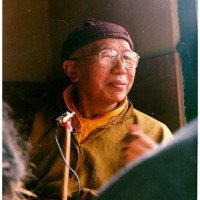Didn’t the Buddha say that the mind in itself has no form, no sound, no smell, no taste, no texture, no dharmas? Here,dharma means mental object. He did not call it empty or void, he called it emptiness. This ‘-ness’ means the same as ‘ta’ in the word dharmata, or tathata. This word ‘ta’ refers to being cognizant, and this it what we should understand as its meaning.
What the Buddha said exactly was that mind is the unity of empty and cognizance. It is not said that space is emptiness; space is merely empty. This is how to discriminate between space and mind: space is empty and mind is emptiness. This word ‘ta’ is also used in dharmata, sameness, suchness. This suffix ‘-ness’ always refers back to the cognizant wakefulness. You never said that awareness is empty, you always say that it is emptiness.
In short, awareness is not only empty, it can also know. This knowing is the cognizant nature when you speak about empty essence, cognizant nature – it is not some brillant light like a light bulb. Do not understand it like that. What it means is a sense of being present like the vivid quality of being wide awake. It is empty of any identity, yet it is naturally awake and not limited to being one or the other; it is not an either-or situation.

Tulku Urgyen Rinpoche
from the book Vajra Speech: A Commentary on The Quintessence of Spiritual Practice
translated by Erik Pema Kunsang
Read a random quote or see all quotes by Tulku Urgyen Rinpoche.
Further quotes from the book Vajra Speech:
- Obscurations and negative karma
- Let appearance and awareness be indivisible
- Still be seduced by appearances
- Recognizing rigpa no matter what occurs
- Like a blazing fire
- Openness
- Ignorance
- Just naturally alert